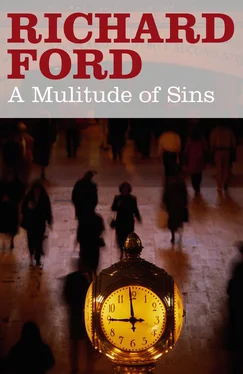“I intend to lose mine someplace,” Frances said. He felt her hard-as-a-board little gymnast’s thigh (conceivably innocently) brush by his knee as she slid away from the long head table. “You find us a bar, okay? I’ll find you .” She placed her small hand onto his large one and squeezed. “I’m off to the whatever.” She started for the rear doors, leaving him alone at the table.
A Negro woman’s big round face had for a while been staring at them through the round porthole window in the kitchen door. The crew in there were wanting to go home. But when Howard caught the woman’s eye, she winked a big lewd wink which he didn’t appreciate.
This was how these things happened, he understood, fingering his chintzy agent-of-the-year plaque. He would see Frances Bilandic after tonight. No way it wouldn’t happen. He had no pre-vision about the circumstances or what the degree of risk would be — if they’d go straight to bed or just have lunch. But in the fervid yet strangely familiar way he knew sex could make a point-of-no-return out of the most unsuspecting and innocent human interaction, nothing now seemed to make any difference but the two of them having a drink and almost certainly giving serious thought to fucking each other senseless in the not too distant future. And she knew it. She was definitely up for whatever this would lead to — the little brush against his leg was no mistake. Women were all different now, he thought, working women especially. A blow job meant what a handshake used to. When he’d driven down the teeming, vacationer-swarmed corridor of I-95 tonight, he’d had no idea there was even a Frances Bilandic on the planet, or that she’d be waiting for him, and that in the time it took to get designated agent of the year, they’d be wandering off in search of a dark little bar for some dirty work. The world was full of wondrous surprises. And he was absolutely ready for this one, ready to find out all the mysteries and wonders it was ready to bring.
He looked back at the porthole window where the black woman’s face had appeared and winked at him. He wanted to give her some kind of answering look, a look that meant he knew what she knew. But the window was empty. The light behind it had been turned off.
In Phoenix, the Weiboldt “Sales Festival” had taken over a towering chrome-and-glass Radisson in a crowded western foothill suburb that presented big views back toward the oppressive, boundariless city. There were two golf courses, forty-five tennis courts, a water-fun center for kids, an aquarium, a casino, an IMAX, a multiplex with eighteen screens, a hospital, a library, a crisis counseling center and an elevated monorail that sped away someplace into the desert. All this seemed to guarantee silent and empty hallways where no one would encounter the two of them together, empty back stairways, and elevators opening onto faces neither of them would ever see again. Plus sealed, air-conditioned rooms with heavy light-proof curtains, enormous beds with scratchy sheets, giant TVs, full minibars, jacuzzis and twenty-four-hour anonymous room service.
Yet they knew they could be detected by any hint that something was funny. Following which they would immediately lose their jobs. Real estate wasn’t like it used to be, when an office romance flamed up and everybody thought it was sweet and looked the other way (to gossip). Office romances, even romances that took place between offices miles apart, now landed you in federal court for polluting the workplace with messy personal matters that interfered with the lives of loser colleagues obsessed with getting rich in a boom market and looking for an excuse for why they’d crapped out. Personal was now a term that meant something like criminal. Everyone was terrified.
Consequently, Howard and Frances had flown out from separate airports — Providence and Hartford — and requested rooms in different “towers.” Howard had requested a smoking room, though he didn’t smoke, then asked that no calls be put through. The first night, at the Platinum Club ice-breaker, they’d mingled with completely separate crowds — Frances with some high-spirited lesbian agents from New Jersey; Howard with some dreary, churchy Mainers. Afterward, they’d gone off to different daiquiri bars, then to separate Mexican restaurants, where they made certain not to drink too much and to talk about their spouses non-stop, without once mentioning each other’s name or even Connecticut.
As a result, by the end of night one, when Frances tapped lightly on Howard’s door at eleven-thirty ready for fun, they each found it not immediately easy to set aside their blameless public disguises, and so had sat for an hour across a little wooden card table in uncomfortable hotel chairs, doing nothing but discussing what had happened that day, even though their days had been 100 percent the same.
Frances liked talking about real estate. To her surprise, she’d enjoyed her night out with the “Garden State lesbos,” had picked up on some new thinking about cold-call strategies in low-income, ethnic concentrations, and had discovered she had useful intelligence of her own to put into play about structuring earnest-money proffers so that the buyer offered full price up-front, but was protected right to closing, and could get out without a scratch in case of buyer’s remorse. She said that because her husband, Ed, had suffered an industrial accident in the indistinct past, an unspecified injury that left him not fit to work anymore (he was “older”), she’d been forced to jump into real estate as her full-time career, whereas she’d hoped to be a physiotherapist, and maybe work in France. It was a stroke of luck, she felt, that she’d turned out to be so “goddamned good at selling.”
Howard, on the other hand (he’d already explained this in the dark and cozy boss-and-secretary bar they’d found after the awards banquet in August) thought of selling real estate as just a “bridging strategy” between his first job out of college (playground supervisor) and something more entrepreneurial, with travel, an incentive bonus and a company car built into the equation. His entire family were lifelong Republicans, and two of his brothers were engineers in the road-paving business down in New London, and they were thinking of bringing him in. The only problem was that he didn’t get along with those brothers that well, and his wife, Mary, didn’t like them at all. Which was why he was still selling houses.
Frances had brought a bottle of not very cold, not very good Pinot Grigio, and it sat sweating on the hotel table attended by two clear-plastic bathroom cups they were drinking out of. The vast and darkened desert colossus of Phoenix lay to the east beyond the window glass — cars moving, planes descending to outlined runways, blue police flashers flashing, wide, walled neighborhoods tainting patches of the night pumpkin orange with their crime lights. It was exotic. It was the west. Neither of them had ever been here, though Howard said he’d read that Phoenix was the American city where you were most likely to get your car stolen.
Frances liked Howard Cameron. Feeling drunk, jetlagged and talked out, she appreciated that he could come up with this good humor, yet could also exhibit caring sensitivity — in this case, not to presume upon her for showing up in his room, though they’d been in bed together four different afternoons in four different seaside motels since the awards banquet. He understood consideration (even though she assumed he was ready to pop with desire just like she was). He also recognized the precarious situation they were in and how she might feel stressed. True, he was ready to cheat on his wife back in Pawcatuck; but he also seemed like a decent family man with a strong sense of right and wrong, and no real wish to do anybody harm. She felt the same. It was tricky. There was probably a category in some textbook for what the two of them were doing, slipping around this way, but she wasn’t ready to say what it was.
Читать дальше












